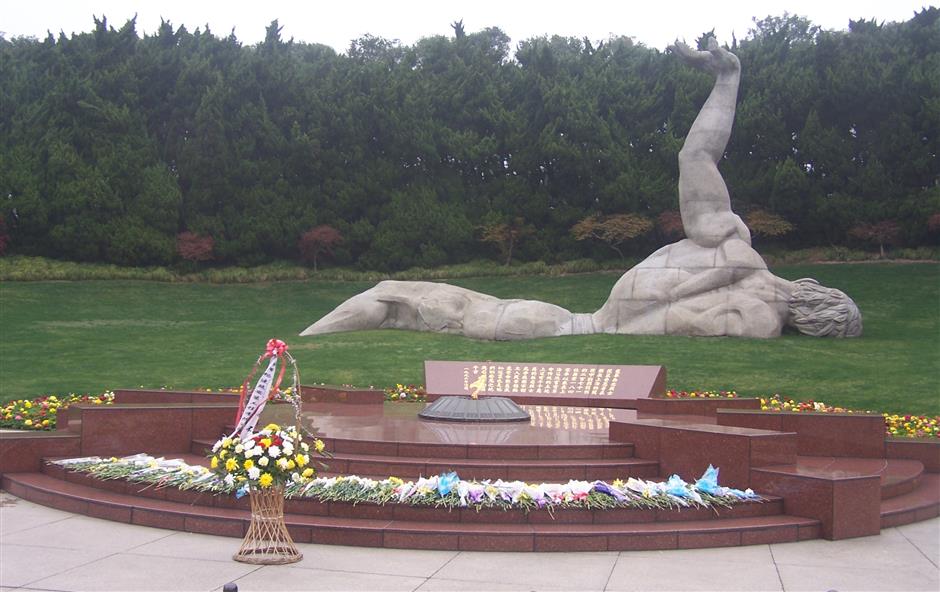Authorities to ban dancing at martyrs' cemetery

Flowers are placed in front of a sculpture symbolizing sacrifice at Longhua Martyrs’ Cemetery during Qingming Festival in this file picture.

A screenshot shows people dancing at the cemetery, which sparked controversy.
Authorities are to ban group dancing, musical instruments and playing cards at Longhua Martyrs' Cemetery in Xuhui District after complaints that its tranquil and solemn atmosphere has been disrupted.
Xuhui authorities said they are exploring ways of creating spaces nearby for such activities.
The cemetery recently received several letters of complaint. One from a descendant of a martyr read: "Only when the martyrs' statues stand dignifiedly, when the martyrs' tombstones lie in peace, can the Chinese people be guaranteed to live with dignity." It added: "We should never forget those who sacrificed themselves to protect our country and its people."
According to a cemetery official surnamed Da, many dancers mistook the cemetery for a public park. "I also have elderly parents and hope they can live a healthy life by ways like dancing. But here, we have another group of people who visit the cemetery to show their respect to the martyrs sacrificing themselves for us, who shouldn't be disrupted by the dancers."
Notices stating no group dancing can be found in several places in the cemetery. A security guard told Shanghai Daily that most of the dancers are in their 60s or 70s. "What we can do is patrol the cemetery and dissuade the dancers from doing so, though in most cases it is in vain."
He said on Sunday dancers had quarrelled with some visitors who told them it was wrong to dance there.
Another security guard said sometimes elderly people got upset and aggressive when they tried to persuade them to leave the cemetery. "You can't go hard on them as they are old," said the guard. "It is a responsibility we cannot afford to bear if accidents happen to any of the elders during negotiations."
One dancer told Shanghai Daily: "Every morning we dance here only for a while and often leave before 9:30am. And we never do that on special days like Qingming Festival (a key time for people to pay their respects). At our age we don't have too many needs to be met and the only thing we require is a happy and healthy life."
Some view the cemetery, which opened in 1995, to still be its predecessor Longhua Park, where they played and exercised when they were young.
Another dancer said: "My company moved here in 1980 from the previous Zhabei District. After that I always jog and play badminton in Longhua Park." After it was turned into a cemetery, she didn't find another place to exercise or dance so she still came.
Some dancers said they would move to another place nearby if the authorities could provide one. "We just want a place to dance," one said.
Da said that when the park became a memorial cemetery, it changed to a place to show respect to revolutionary martyrs. "As long as it's a martyrs' cemetery, it is a solemn place," Da said.
A 68-year-old visitor, surnamed Huang, said it was immoral to dance in any cemetery, let alone one for revolutionary martyrs. "They should find another place to dance."
Another elderly man, Hu Chuanlong, said he visited the cemetery every Sunday. He told Shanghai Daily: "Those people have been using the square in the cemetery as exercise space for years. I think they will stop if they have somewhere else to go, after all none would like to dance around someone else's tomb."
For 82-year-old Wu Shaolong, nephew of martyr Wu Zhongwen, his hope was to restore peace to the cemetery where his aunt lay. "They don't have a belief and only seek their own happiness," Wu said. "I hope these people could be educated by authorities for what they did."
His aunt was a member of Communist Party of China who was executed by the Kuomintang party in 1931. She was one of the “Longhua 24 Martyrs,” whose remains were dug out from the Longhua area in 1950.
Entertainment activities like group dancing, playing musical instruments and even cards are banned in the entire cemetery, the Shanghai Civil Affairs Bureau said, adding some of these activities even disrupt normal memorial service.
In some areas, including the memorial square and tomb, all activities not related to paying tributes to martyrs are banned, the bureau said.
The cemetery is the largest of its kind in Shanghai and a protected cultural relic.
Square dancing is one of the most popular activities in China for middle-aged and senior citizens.
Shanghai Zoo said loud music had disturbed animals and it once alerted police after elderly residents smashed signs on being asked to turn down their music while dancing. They were dancing in the early morning in an area reserved for amphibians and reptiles.
Shanghai Greenery and Public Sanitation Bureau's 2018 civilized park tour behavior regulations call on visitors to avoid using loud audio equipment and not to affect others' normal life when exercising or carrying out other activities.















